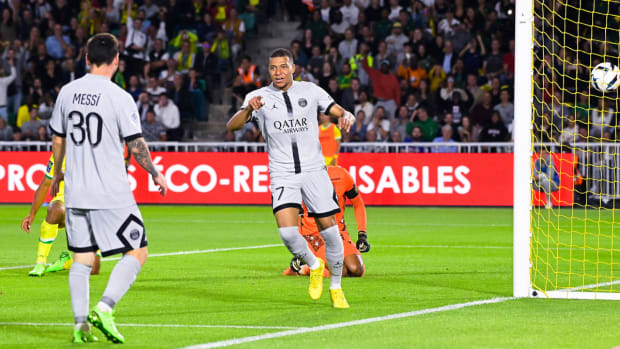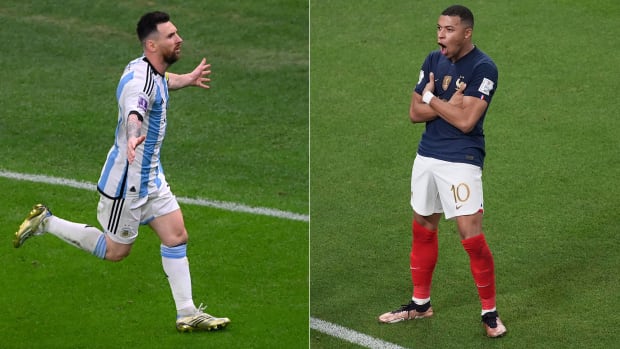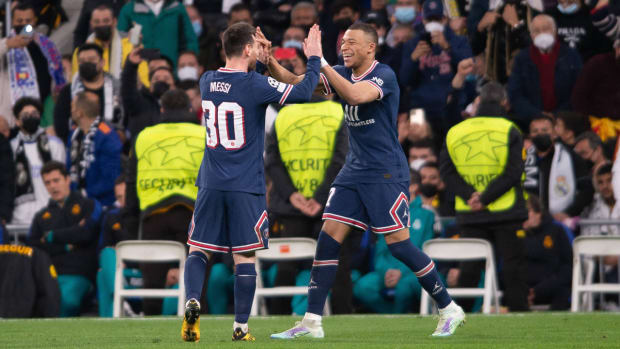AL RAYYAN, Qatar — It felt like one of those seismic World Cup days when both history and the future are being rewritten, or when one era veers sharply into the next. Argentina and France had engaged in an epic round-of-16 duel in Kazan, Russia, that featured seven goals, the inevitable collapse of the flawed South Americans and the emphatic global emergence of Kylian Mbappé, the 19-year-old Parisian phenom whose confidence and control at blazing speed made all the difference.
Following a 4–3 France victory that marked the only time the pending champion would be in any real trouble during the 2018 World Cup, one could easily imagine that when Mbappé shook hands with Lionel Messi and lightly and respectfully embraced him, a metaphorical torch was being passed.
The Argentine icon had looked frustrated and forlorn in Russia. Either he was letting his country down or his country was letting him down—pick your hot take. Somehow, despite Messi’s commitment and incomparable brilliance, international soccer just wasn’t working out for him. Argentina’s trophy drought had reached a quarter century. Messi’s peers were fading and the right coach and culture were elusive.

Moritz Müller/Imago Images
Meanwhile, Europe was cementing its dominance, with France and its absurdly rich vein of developing talent in the ascendancy. Mbappé, who tallied twice that day against Argentina, scored again in the final and was on his way to becoming the most valuable player in the world.
"That changed my life, and I think after that World Cup everything was different because you know how the World Cup is—all the world is watching,” Mbappé told Sports Illustrated this summer. “It was not the end when I won the World Cup. It was the first chapter of something crazy. I wanted to use this success. I want to write my name in the history of the game.”
All world champions do that, to an extent. Some, however, warrant their own volume. There was no torch passed that day in Kazan, because it was also the unexpected first chapter of something crazy for Messi. No one could’ve foreseen the pair embracing regularly after combining on goals as teammates at Paris Saint-Germain. And many could’ve only hoped for Messi’s remarkable national team renaissance, which will culminate in Sunday’s World Cup final against France and Mbappé.
Argentina’s next generation turned out to be talented and totally devoted to helping Messi, 35, realize his Albiceleste dreams. They’re willing to do the running, pressing and chasing so that their captain can read and dissect defenses at his pace and at the ideal moment. They bring out the best in Messi’s often reserved personality, and he’s become a vocal and inspiring leader and spokesman. In Lionel Scaloni, Argentina has found a modest yet passionate manager with a deft interpersonal and tactical touch. They won a long-awaited trophy together at last year’s Copa América, and they’ve careened through this World Cup, following a shocking debut loss to Saudi Arabia, with fervor and joy.
“It’s madness,” Argentina defender Cristian Romero said of Messi’s journey following Tuesday’s semifinal defeat of Croatia. “Everyone knows what he is as a player, but it’s the kind of person he is. He’s an example—a guy who always wants more. He has taken so many hits but he always gets back up again.”

Federico Pestellini/PanoramiC/Imago Images
Messi and Mbappé have shared the (on-field) headlines throughout this tournament and on Sunday evening at Lusail Iconic Stadium, they’ll meet again—not in a moment of transition, but in a contest for a special sort of immortality. Messi, who has said multiple times that he believes this will be his last World Cup, is just 90 minutes from the trophy he and his countrymen covet most. It would be a golden coda on his spectacular career that would silence all the lingering arguments.
Mbappé, who turns 24 next week, would be a repeat champion—the first since the Brazilians in 1962—and the clear heir to Messi’s throne. As someone who’s already interested in business beyond football, and who has the charisma and cosmopolitan qualities to meet the demands of modern superstardom, Mbappé would be subject to a level of scrutiny and celebration that will probably dwarf that which has been focused on Messi and Cristiano Ronaldo. Times have changed, and Mbappé is a singular talent.
"France is the top footballing country in the world," Morocco coach Walid Regragui said following Wednesday’s semifinal loss to Les Bleus, during which Mbappé was involved in both French goals.
"Messi knows that it's his last opportunity to win a World Cup,” he continued. “But Mbappé is also a fantastic player, and it would be wonderful for him to win the World Cup. We said he was the new Pelé, and if he wins the World Cup again, he would be emulating Pelé.”
Comparisons to Pelé at only 23 years of age? That’s just about the brightest spotlight possible.
The World Cup’s outstanding player award, the Golden Ball, will almost certainly be given to the winner. Messi and Mbappé lead the Golden Boot race with five goals each. Messi has a tournament co-leading three assists and Mbappé two, while none of the Frenchman’s goals came from the penalty spot. Mbappé leads the tournament in shots. Messi is second. They’re second (Messi) and third (Mbappé) in key passes. Messi has drawn the most fouls. Mbappé has been responsible for the most shots created.
This has been their World Cup, and each has already furnished indelible, viral highlights. Messi’s smart positioning, touch and long-range finish past Mexico’s Guillermo Ochoa in the second half of Argentina’s second game may have been the celebratory sigh of relief of the tournament. And Messi's stunning no-look through ball to Nahuel Molina in the quarterfinal against the Netherlands, and then the corkscrew dribbling run to set up Julián Álvarez in the semi, will be part of every career highlight reel.

Imago Images (2)
Meanwhile, Mbappé has been breathtaking. There’s now no experience in the sport like seeing him live, as he nimbly evades defenders in tight spaces or blows past them over distance as if their legs don’t work. His second-round double against Poland was an unstoppable display of power and precision. While France entered the tournament with multiple first-choice players lost to injury and a revamped midfield, Mbappé, who played on the right in Russia and is now on the left, has never blinked or appeared burdened.
“He’s an exceptional player. He sets records. He has the ability to be decisive, to stand out from the crowd. … Opponents have to rethink their structure, rethink their formation, when coming up against Kylian,” said France coach Didier Deschamps, who’s already won the World Cup as a player and manager.
“He’s a leader. To me, there are three types of leadership: a physical leader, a technical leader and a mental leader, who’s expressive. I don’t think that leadership has just one face. Just because [injured veteran] Paul Pogba’s not here, there are other people who know how to raise their voice," Deschamps added. "Kylian isn’t very talkative, however he’s like a steam train on the pitch. He’s the one that gets the crowd going, and he wants to give it all for the French team.”
The stakes of this World Cup, this moment in their careers and the status of their respective teams—Argentina relying on a lot of first-timers, France changed by injury—has put an intriguing focus on personality and behavior.
Mbappé yearns to be a citizen of the world. He cares about his image and he cares about others. One of France’s pre-World Cup distractions (that appeared to have no on-field impact whatsoever) was the dispute between Mbappé (and some teammates) with the French Football Federation about image rights. Mbappé didn’t want to be linked to products like alcohol or fast food, and he’s been photographed here turning the name of FIFA’s beer sponsor, which is engraved prominently on each man-of-the-trophy, away from cameras (he’s won three compared to Messi’s four).
He’s launched a production company in Los Angeles. He has a foundation that supports Parisian children, and donates his national team appearance money.
“You have to do this type of thing when you feel you are ready, and I feel I'm ready right now,” Mbappé said this summer regarding projects beyond the pitch. “It’s the time to create something new because I think life changes [and] the sport changes. There is a new mentality now, and I think it's time to do more than just playing, more than just doing things about football.
"Normally you start when you’re 30, 32 and you think about what you can do after your career,” he continued. “But me, I have this feeling that I can do something special.”
Nevertheless, here in Qatar, the trilingual Mbappé has pressed pause on that desire to reach out and communicate. He said nothing to the media until the round of 16, ignoring FIFA’s man-of-the-match press conference mandates, and hasn’t been heard from since.
The historic journey he’s on requires every sliver of his attention.
“I just needed to focus on the tournament and on my football and when I want to concentrate on something, that’s the way I function,” Mbappé said after seeing off Poland at Al Thumama Stadium, adding that he was willing to pay the fine levied on the FFF.
“This is the competition of my dreams and I’m delighted to be here, and I’ve been preparing for this tournament all throughout the season physically and mentally. I wanted to be ready for this tournament and I am. … I came to win this World Cup. I didn’t come here to win the Golden Boot or Golden Ball.”
Messi, on the other hand, can’t stop talking. Here’s this player who so frequently has appeared shy and reticent, who, unlike Mbappé, seems to be perfectly happy just sitting at home with wife, kids and their enormous dog (a French Mastiff, ironically), and he’s become the voice of Argentina’s World Cup run as well as its feet and face. He’s doing press conferences, stopping in mixed zones, rallying his teammates and trash-talking opponents. Messi’s “Qué mirás bobo?”—“What are you looking at, fool?”—moment during a quick TV interview following the quarterfinal has become as seminal as his goals and assists.

Jorge Ropero/Agencia LOF/Imago Images
It’s as if a switch flipped following last summer’s Copa. Messi is permanently and unquestionably beloved in Argentina, alongside the late Diego Maradona. There’s an understanding and appreciation for Messi’s devotion, and that it isn’t his fault that his own brilliance altered what we believed was possible for one player in a team sport. Messi is already considered by multitudes as the best of all time. He’s transitioned from having to win the World Cup to wanting to win the World Cup. And so buoyed by the right coach and right locker room, he’s now unfettered, and the planet is seeing a fresher, more fun side of him as this unique tournament progresses and the finish line draws closer.
"I’m honored to be able to train him, to see him play,” Scaloni said after the semifinal at Lusail. “It’s something exciting because every time you see him play, it’s a huge source of motivation for his teammates, for his people, for the Argentines and the whole world. There is nothing left to say about Messi. It is indeed a privilege to have him in the squad.”
A next tier of immortality waits—even beyond the “VVIP” room, as FIFA likes to call it. France has advanced to four of the past seven World Cup title games, and it’s easy to imagine Mbappé playing in two or three more tournaments and making another run. His story is far from finished. But it would enter an unprecedented chapter if Les Bleus win Sunday. He would stand astride the world. For Messi, there could be no more satisfying achievement. Not only is he poised to finally lift the World Cup, but he could do so following a dominant month easily comparable to Maradona’s in 1986, during which Messi’s evolving perspective has somehow burnished his sensational skills.
"I feel really good. I feel more experienced and mature. I try to make the most of every moment. I try to live my life with intensity. To sum up, I want to enjoy every moment of my life, whether it’s in the World Cup, in the Copa América or in any other game,” Messi said upon arriving in Qatar. “When I was younger, I didn't reflect on those moments. I would just live them. I only wanted to play. … So overall, I didn't give as much importance to key moments in my career.
“I am aware that this is a very special moment,” he added. “It is, most likely, my last World Cup, the last opportunity to make my dream—our dream—a reality.”







